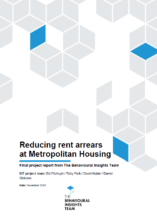Key findings
Rent arrears are a considerable challenge for Metropolitan Thames Valley Housing (Formally Metropolitan), with around 15-20% of MTVH customers in arrears at any one time. To address these challenges, BIT undertook a project adopting BIT’s standard TEST framework for how we approach a behavioural insights project. This covers four phases: Target (defining the target behaviour we wish to change); Explore (understanding the context within which decisions are made); Solution (creating interventions based on our previous trials and the behavioural science literature); and Trial (designing and running a robust trial to understand the impact of these interventions).
In this project, the overarching aim was to reduce MTVH’s rent arrears, with three specific Target behaviours:
- Encouraging greater uptake of Direct Debit among general needs customers
- Encouraging customers to pay on time and thus reduce the number of those entering arrears
- Encourage those who do enter arrears to clear their arrears or come to an arrangement more
Consequently we conducted 3 Randomised Control Trials the results of which are outlined in detail in the report:
Trial 1: Increase the proportion of customers who pay their rent by DD, based on the premise that Disorganised customers are less likely to fall into arrears if they have a DD that does not require a repeated action to pay their rent.
Trial 2: Remind customers when it is time to pay their rent. Strategic and Disorganised customers may respond to a timely prompt to pay, which is intended to reduce the number of customers entering arrears.
Trial 3: Increase the speed that customers exit arrears by improving MH’s suite of arrears communications. At the individual level, we do not know if customers are Struggling, Strategic, or Disorganised, so this trial tested a series of behaviourally-informed communications that incorporated insights designed to motivate payment amongst Strategic and Disorganised customers, and to increase contact from those Struggling or unable to pay.








